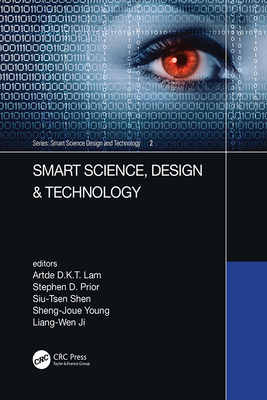商品描述
Smart Design, Science & Technology represents the proceedings of the IEEE 6th International Conference on Applied System Innovation (ICASI 2020), which was held in Taitung, Taiwan November 5-8, 2020. The conference received more than 200 submitted papers from at least 11 different countries, whereby roughly one third of these papers was selected by the committees and invited to present at ICASI 2020. This book aims to provide an integrated communication platform for researchers from a wide range of disciplines including information technology, communication science, applied mathematics, computer science, advanced material science, and engineering. Only high quality papers were allowed to publish in the volume. Hopefully, interdisciplinary collaborations between science and engineering technologists in academia and industry will be enhanced via this unique international network.
商品描述(中文翻譯)
《智慧設計、科學與技術》代表了IEEE第六屆應用系統創新國際會議(ICASI 2020)的會議論文集,該會議於2020年11月5日至8日在台灣台東舉行。會議共收到來自至少11個不同國家的200多篇提交論文,其中約三分之一的論文被委員會選中並邀請在ICASI 2020上進行報告。本書旨在為來自資訊科技、通信科學、應用數學、計算機科學、先進材料科學和工程等多個領域的研究人員提供一個綜合的交流平台。僅高品質的論文被允許在本卷中發表。希望透過這個獨特的國際網絡,能夠增進學術界和產業界之間科學與工程技術專家的跨學科合作。
作者簡介
Dr. Artde D.K.T. Lam was born in Hong Kong on February 23, 1965. He received the B.S. degree in mechanical engineering from National Cheng Kung University (NCKU), Tainan, Taiwan, in 1987, and the Ph.D. degree in mechanical engineering (in field of mechanical design) from National Sun Yat-Sen University (NSYSU), Kaohsiung, Taiwan, in 1993. Currently, he is a Distinguished Professor in Department of Digital Design, Fujian University of Technology, Fuzhou, Fujian, P. R. China. His current research interests include nanotechnology, innovation design, creative design and Fractal Theory. Dr. Stephen D. Prior has been working in the area of Field Robotics for the past 25 years. His research interest in autonomous systems relates to a shortlisted entry to the MoD Grand Challenge event in August 2008, where he led a team to design, make and test a novel drone, which consisted of a patented Y6 arrangement. On the basis of this, he founded the Autonomous Systems Lab and has been researching with a small team of staff/students working on defence-related robotic technologies. His team won the DARPA UAVForge competition in 2012, and he continues to lead teams to success in the annual IMechE UAS Challenge event. He is on the editorial board for the International Journal of Micro Air Vehicles & Unmanned Systems and has published widely on the subject. During the last few years he co-founded a Tethered UAS company developing a persistent stare capability. Siu-Tsen Shen has studied widely, gaining her Masters degree in Industrial Design Research from the Design Academy of Eindhoven, and her PhD in Design from Goldsmiths College, University of London. She has been a visiting professor at UCL and Middlesex University, UK and is currently a Professor in Multimedia Design at the National Formosa University, Taiwan. Her research interests lie in the areas of HCI, User-Centred Design, Cross-Cultural Research, User Interface Design, and Design Team Formation using Personality Type. She has taught on a number of different programmes including Introduction to Multimedia Design, Creative Thinking & Design Methods, Cognitive Psychology and Emerging Technology. She is the Editor-in-Chief of the Journal of Cultural and Creative Industries Research (ISSN 2221-6170) since 2018. She leads a technical committee for Innovation in Design, Communication and Engineering(ICICE) since 2012 and International Conference on Applied System Innovation (ICASI) since 2015. Dr. Sheng-Joue Young was born in Tainan, Taiwan on June 22, 1981. He received his B.S. degree from Department of Physics, National Changhua University of Education, Changhua, Taiwan in 2003, M.S. and Ph.D. degree from Institute of Electro-Optical Science and Engineering and Institute of Microelectronics, National Cheng Kung University (NCKU), Taiwan in 2005 and 2008, respectively. He was a visiting research student with the Graduate School of Engineering, Chiba University, Chiba, Japan from July 2007 to September 2007. In 2010, he became an Associate Professor with the Department of Electronic Engineering, National Formosa University (NFU), Yunlin, Taiwan, and was promoted to Associate Professor on August 01, 2013. He is also a Distinguished Professor of the Institute of Creative Industries Research, Fuzhou University; period from Jan. 1, 2014 to Dec. 31, 2014, and guide the Institute to carry out academic research. His current research interests include semiconductor physics, optoelectronic devices and nanotechnology. He has published more than 100 SCI and EI papers in recent years. Liang-Wen Ji was born in Taipei, Taiwan, in 1965. He received a BSc. degree in Physics, a M.S. degree in Material Science, and a Ph.D. degree in Electrical Engineering from National Cheng Kung University (NCKU), Tainan, Taiwan. In 2007, he became a Professor with the Institute of Electro-Optical and Materials Science, National Formosa University (NFU) and was promoted to Distinguished Professor in 2018. He is currently the Editor-in-Chief of the Journal of Science and Innovation (ISSN 2078-5453). From August 2005 to July 2006, he served as the Director of the R&D Center for Flat Panel Display Technology, NFU. His current research interests include semiconductor physics, optoelectronics, and nanotechnology. Dr. Ji was a recipient of the Research Award from Lam Research Taiwan Co., Ltd., Taiwan, in 2004. He is a TIKI Fellow and a member of the IEEE.
作者簡介(中文翻譯)
林德基博士於1965年2月23日出生於香港。他於1987年獲得國立成功大學(NCKU)機械工程學士學位,並於1993年獲得國立中山大學(NSYSU)機械工程博士學位(專攻機械設計)。目前,他是福建工程學院數位設計系的特聘教授。他目前的研究興趣包括奈米科技、創新設計、創意設計和分形理論。史蒂芬·D·普萊爾博士在場域機器人領域工作了25年。他對自主系統的研究興趣與2008年8月的國防部大挑戰活動有關,當時他帶領團隊設計、製造和測試一種新型無人機,該無人機採用了專利的Y6佈局。基於此,他創立了自主系統實驗室,並與一小組員工/學生研究與國防相關的機器人技術。他的團隊在2012年贏得了DARPA UAVForge競賽,並持續帶領團隊在每年的IMechE UAS挑戰賽中取得成功。他是《國際微型空中載具與無人系統期刊》的編輯委員會成員,並在該主題上發表了大量文章。在過去幾年中,他共同創立了一家開發持續監視能力的繫留無人機公司。沈秀岑廣泛學習,獲得了荷蘭埃因霍溫設計學院的工業設計研究碩士學位,以及倫敦大學金史密斯學院的設計博士學位。她曾擔任英國倫敦大學學院(UCL)和米德塞克斯大學的訪問教授,目前是國立虎尾科技大學多媒體設計系的教授。她的研究興趣包括人機互動(HCI)、以使用者為中心的設計、跨文化研究、使用者介面設計以及基於人格類型的設計團隊組成。她教授過多個不同的課程,包括多媒體設計導論、創意思維與設計方法、認知心理學和新興技術。自2018年以來,她一直擔任《文化與創意產業研究期刊》(ISSN 2221-6170)的主編。自2012年以來,她領導設計、傳播與工程創新技術委員會(ICICE),並自2015年以來領導應用系統創新國際會議(ICASI)。楊勝久博士於1981年6月22日出生於台南,台灣。他於2003年獲得國立彰化師範大學物理系學士學位,並於2005年和2008年分別獲得國立成功大學(NCKU)電光科學與工程研究所及微電子研究所的碩士和博士學位。他於2007年7月至2007年9月期間,擔任日本千葉大學工程研究所的訪問研究生。2010年,他成為國立虎尾科技大學(NFU)電子工程系的副教授,並於2013年8月1日晉升為副教授。他同時也是福建大學創意產業研究所的特聘教授,任期自2014年1月1日至2014年12月31日,並指導該所進行學術研究。他目前的研究興趣包括半導體物理、光電裝置和奈米科技。近年來,他發表了超過100篇SCI和EI論文。紀良文於1965年出生於台北,台灣。他獲得國立成功大學(NCKU)物理學學士學位、材料科學碩士學位和電機工程博士學位。2007年,他成為國立虎尾科技大學(NFU)電光與材料科學研究所的教授,並於2018年晉升為特聘教授。他目前是《科學與創新期刊》(ISSN 2078-5453)的主編。從2005年8月到2006年7月,他擔任NFU平面顯示技術研發中心主任。他目前的研究興趣包括半導體物理、光電學和奈米科技。紀博士於2004年獲得台灣Lam Research公司的研究獎。他是TIKI Fellow及IEEE會員。














